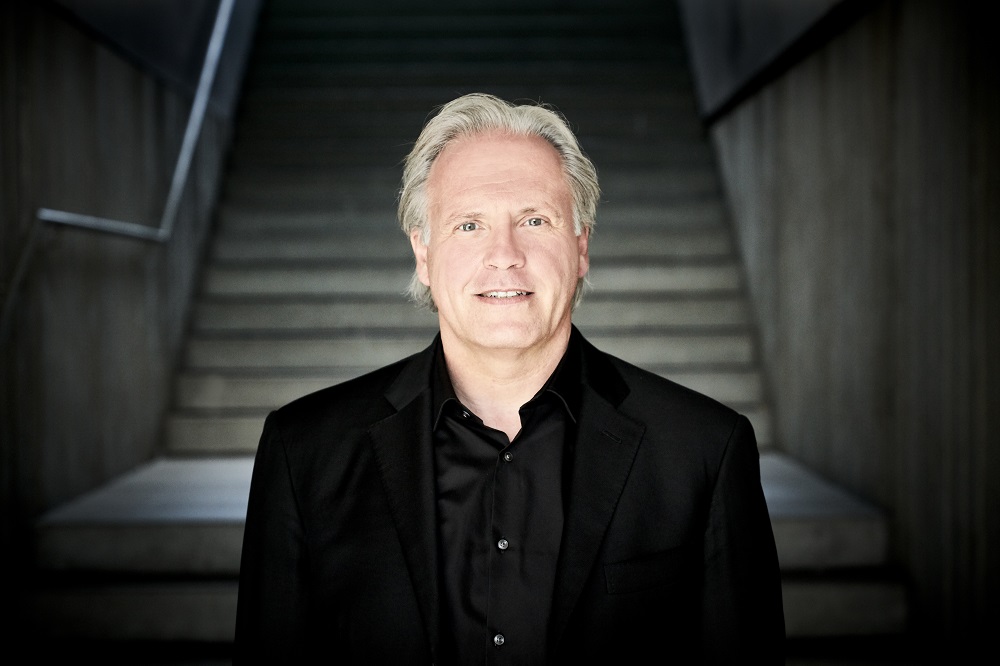
Elizabeth Llewellyn (soprano, below), CBSO Youth Chorus (chorus-master, Julian Wilkins), City of Birmingham Symphony Orchestra / Jérémie Rhorer
Debussy Nocturnes L98 (1899)
Ravel Shéhêrazade M41 (1903)
Debussy Prélude à l’après-midi d’un faune L86 (1894)
Stravinsky Symphony in Three Movements (1945)
Symphony Hall, Birmingham
Thursday 9 May 2024
Reviewed by Richard Whitehouse Picture of Jérémie Rhorer (c) Caroline Doutre, Elizabeth Llewellyn (c) Frances Marshall
Programmes featuring no Austro-German content are rarer than might be thought these days, so making this evening’s concert from the City of Birmingham Symphony Orchestra with the highly regarded conductor Jérémie Rhorer not only more unexpected but also more welcome.
There could be few more understated openings to such a programme than the Nocturnes that Debussy completed near the start of the 20th century, when the ‘impressionist’ tag randomly applied to his music was at its most relevant. Without denying its essentially rarified quality, Rhorer brought out the ominous undercurrents in Nuages, its emotional eddying abetted by Rachel Pankhurst’s soulful cor anglais while duly complemented by those fervid imaginings of Fêtes, where the central processional felt tangible in its implacability. Nor was there any undue reticence in Sirènes, the CBSO Youth Chorus here repeating its contribution from a couple of seasons ago with a response whose androgynous sound-world did not preclude an expressive poise coming to the fore through the remote ecstasy of this piece’s closing pages.

Among the most potent expressions from its composer’s early maturity, Ravel’s Shéhêrazade made for a natural follow-on. Less a cycle than a sequence of songs, it tends to be dominated by its initial Asie, which made Elizabeth Llewellyn’s performance the more admirable. Not that she ever under-characterized the images of wonder and terror such as pervade the poem’s ‘‘outdated language and cultural depictions’’ (to quote the rider in tonight’s programme), but these were harnessed to a cumulative build-up of intensity that held good over the capricious elegance of La Flûte enchantée, as enhanced by the artful finesse of flautist Marie-Christine Zupancic, then on to the sensuous ambiguity of L’Indifférent with its predictably equivocal close. Rhorer secured playing of subtlety and refinement throughout this memorable reading.
A suitably enervated if never flaccid account of Debussy’s Prélude à l’après-midi d’un faune launched the second half. Distinguished once more by Zupancic’s playing as well as an airily euphonious response by CBSO woodwind, Rhorer teased out the purpose behind any inertia.
Although it could not have made other than a jarring impression in this context, Stravinsky’s Symphony in Three Movements provided an instructive contrast (Roussel’s Third Symphony would have been more apposite – maybe another time?) in its presaging of rhythmic tensility over harmonic langour. Rhorer had the measure of the opening’s movement’s animation, for the most part simmering rather than overt (and some not quite spot-on entries a reminder that this music remains a stern test of technical accuracy), but the highlight was a central Andante whose alternating between the whimsical and beatific confirmed the film-world’s loss as the concert-hall’s gain. The transition into the finale saw a frisson of expectancy, duly confirmed by its remorseless progress toward what is the most visceral outcome in latter-day Stravinsky.
A fine showing, then, from the CBSO and a notable appearance by Rhorer who will hopefully return soon. Next week sees a welcome reappearance by Joshua Weilerstein, major works by Bernstein and Dvořák being set in relief with shorter pieces by Pavel Haas and Caroline Shaw.
Click on the link to read more on the current CBSO concert season, and on the names for more on soprano Elizabeth Llewellyn, conductor Jérémie Rhorer and the CBSO Youth Chorus
Published post no.2,177 – Monday 13 May 2024






